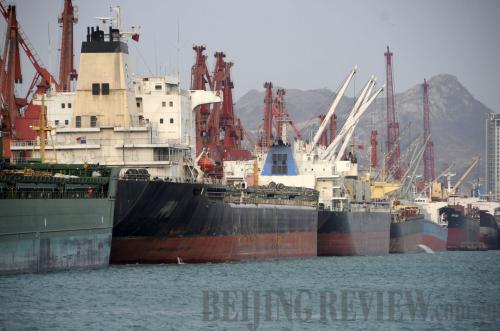|
 |
|
SHIPPING BOOM: Ocean vessels are anchored at the Lianyungang Port, Jiangsu Province. Cargo throughput of the port totaled 40.05 million tons in the first quarter of 2011, up 21.5 percent year on year (WANG CHUN) |
Numbers of the Week
$548.9 billion
China's outstanding external debt amounted to $548.9 billion at the end of 2010, said the State Administration of Foreign Exchange.
34.48 billion yuan
Sales revenues of the national program to subsidize farmers' purchase of home appliances surged 179 percent year on year to reach 34.48 billion yuan ($5.26 billion) in March, said the Ministry of Commerce.
TO THE POINT: By ordering another hike in interest rates, China spares no effort to combat inflation. China's oil giants are faring well, though rising crude prices are putting pressure on Sinopec, China's top oil refiner. China reorganizes the dairy industry, forcing many unqualified producers out of the market. The manufacturing industry has staged a swift comeback, with the purchasing managers index rebounding in March. The U.S. chemicals guru The Dow Chemical Co. makes a push into the Chinese market by building a joint venture with Shandong-based Befar Group Co. Ltd.
By HU YUE
Interest Rate Hike
The People's Bank of China, the central bank, on April 6 raised interest rates for the second time in 2011 in a bid to tackle inflation and let air out of the asset bubbles.
The one-year benchmark deposit interest rate rose to 3.25 percent from 3 percent, while the one-year benchmark lending rate rose from 6.06 percent to 6.31 percent, said the central bank.
As inflation remains a daunting challenge for the economy, China has spent the past six months draining market liquidity and adopting supply-side measures to curb consumer price surges.
"The timing of this particular rate hike is earlier than we have expected, as we forecast that the rate hike would be made in May-June when the headline inflation rate is expected to pick up significantly," said Wang Qing, a Morgan Stanley economist in Hong Kong.
"Our current CPI forecast is 5.2 percent year on year for March," he said. "The interest rate increase also suggests that the Chinese authorities are confident in the sustainability of the underlying growth momentum."
The interest rate hike is necessary since the benchmark one-year deposit rate still lags behind the CPI, said Zhuang Jian, a senior economist with the Asian Development Bank, China Office.
Meanwhile, inflationary pressures are mounting in the country due to massive monetary expansion in Japan and the political unrest in the Middle East, which forced up global commodities prices, he said.
Oil Bonanza
China's oil giants are reaping windfall profits, drawing strength from strong domestic demand for refined oil and chemical products.
PetroChina, the country's biggest oil producer by output, raked in 140 billion yuan ($21.5 billion) in net profits last year, rising 35.6 percent from a year ago.
The offshore oil explorer CNOOC shined as well. Its net profits surged 84.5 percent year on year to reach 54.41 billion yuan ($8.4 billion) in 2010. The crude futures prices in London averaged $79.47 a barrel in 2010, up 29.2 percent from a year earlier.
Compared with their upstream-focused peers, performance of the oil refiner Sinopec was less bright as rising crude prices made a dent to its refining division. The company earned net profits of 70.71 billion yuan ($10.9 billion) last year, up 12.8 percent from 2009.
Sinopec relied on imports to meet 78 percent of its needs for crude oil, but the refiner is less able to pass the costs pressure to consumers.
Under the current fuel pricing regime, policymakers consider price adjustments when the moving average of international crude oil prices changes more than 4 percent over a period of 22 consecutive working days. In its lastest move, the National Development and Reform Commission on April 7 raised the domestic wholesale prices of gasoline and diesel by 500 yuan ($76) and 400 yuan ($61) per ton, respectively.
However, last year's retail price increase was much smaller than the surge in crude prices as the government worried about inflation.
Sinopec said that its future sustainable development will depend partly on further discoveries or acquisitions of oil and natural gas resources.
The company plans to invest 54.3 billion yuan ($8.3 billion) in the exploration and development sector in 2011, accounting for 43.8 percent of its total capital expenditure.
| 